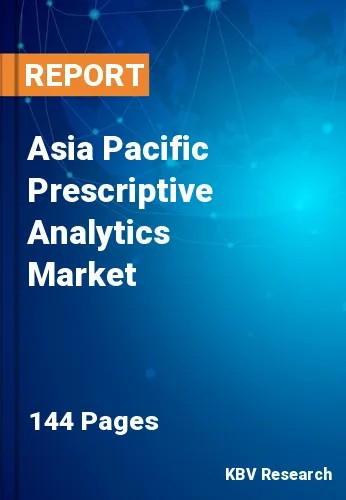Chapter 1. Market Scope & Methodology
1.1 Market Definition
1.2 Objectives
1.3 Market Scope
1.4 Segmentation
1.4.1 Asia Pacific Prescriptive Analytics Market, by End Use
1.4.2 Asia Pacific Prescriptive Analytics Market, by Application
1.4.3 Asia Pacific Prescriptive Analytics Market, by Component
1.4.4 Asia Pacific Prescriptive Analytics Market, by Country
1.5 Methodology for the research
Chapter 2. Market at a Glance
2.1 Key Highlights
Chapter 3. Market Overview
3.1 Introduction
3.1.1 Overview
3.1.1.1 Market Composition and Scenario
3.2 Key Factors Impacting the Market
3.2.1 Market Drivers
3.2.2 Market Restraints
3.2.3 Market Opportunities
3.2.4 Market Challenges
Chapter 4. Competition Analysis - Global
4.1 KBV Cardinal Matrix
4.2 Recent Industry Wide Strategic Developments
4.2.1 Partnerships, Collaborations and Agreements
4.2.2 Product Launches and Product Expansions
4.2.3 Acquisition and Mergers
4.3 Market Share Analysis, 2023
4.4 Top Winning Strategies
4.4.1 Key Leading Strategies: Percentage Distribution (2020-2024)
4.4.2 Key Strategic Move: (Partnership, Collaboration & Agreement: 2022, May-2024, Aug) Leading Players
4.5 Porter Five Forces Analysis
Chapter 5. Asia Pacific Prescriptive Analytics Market by End Use
5.1 Asia Pacific IT & Telecom Market by Country
5.2 Asia Pacific Finance & Banking Market by Country
5.3 Asia Pacific Retail Market by Country
5.4 Asia Pacific Healthcare Market by Country
5.5 Asia Pacific Transportation & Logistics Market by Country
5.6 Asia Pacific Other End Use Market by Country
Chapter 6. Asia Pacific Prescriptive Analytics Market by Application
6.1 Asia Pacific Supply Chain Management Market by Country
6.2 Asia Pacific Risk Management Market by Country
6.3 Asia Pacific Operations Management Market by Country
6.4 Asia Pacific Marketing & Sales Market by Country
6.5 Asia Pacific Revenue Management Market by Country
6.6 Asia Pacific Other Application Market by Country
Chapter 7. Asia Pacific Prescriptive Analytics Market by Component
7.1 Asia Pacific Software Market by Country
7.2 Asia Pacific Services Market by Country
Chapter 8. Asia Pacific Prescriptive Analytics Market by Country
8.1 China Prescriptive Analytics Market
8.1.1 China Prescriptive Analytics Market by End Use
8.1.2 China Prescriptive Analytics Market by Application
8.1.3 China Prescriptive Analytics Market by Component
8.2 Japan Prescriptive Analytics Market
8.2.1 Japan Prescriptive Analytics Market by End Use
8.2.2 Japan Prescriptive Analytics Market by Application
8.2.3 Japan Prescriptive Analytics Market by Component
8.3 India Prescriptive Analytics Market
8.3.1 India Prescriptive Analytics Market by End Use
8.3.2 India Prescriptive Analytics Market by Application
8.3.3 India Prescriptive Analytics Market by Component
8.4 South Korea Prescriptive Analytics Market
8.4.1 South Korea Prescriptive Analytics Market by End Use
8.4.2 South Korea Prescriptive Analytics Market by Application
8.4.3 South Korea Prescriptive Analytics Market by Component
8.5 Australia Prescriptive Analytics Market
8.5.1 Australia Prescriptive Analytics Market by End Use
8.5.2 Australia Prescriptive Analytics Market by Application
8.5.3 Australia Prescriptive Analytics Market by Component
8.6 Malaysia Prescriptive Analytics Market
8.6.1 Malaysia Prescriptive Analytics Market by End Use
8.6.2 Malaysia Prescriptive Analytics Market by Application
8.6.3 Malaysia Prescriptive Analytics Market by Component
8.7 Rest of Asia Pacific Prescriptive Analytics Market
8.7.1 Rest of Asia Pacific Prescriptive Analytics Market by End Use
8.7.2 Rest of Asia Pacific Prescriptive Analytics Market by Application
8.7.3 Rest of Asia Pacific Prescriptive Analytics Market by Component
Chapter 9. Company Profiles
9.1 Accenture PLC
9.1.1 Company Overview
9.1.2 Financial Analysis
9.1.3 Segmental Analysis
9.1.4 Research & Development Expenses
9.1.5 Recent strategies and developments:
9.1.5.1 Partnerships, Collaborations, and Agreements:
9.1.5.2 Acquisition and Mergers:
9.1.6 SWOT Analysis
9.2 Amazon Web Services, Inc. (Amazon.com, Inc.)
9.2.1 Company Overview
9.2.2 Financial Analysis
9.2.3 Segmental Analysis
9.2.4 Recent strategies and developments:
9.2.4.1 Partnerships, Collaborations, and Agreements:
9.2.4.2 Product Launches and Product Expansions:
9.2.5 SWOT Analysis
9.3 IBM Corporation
9.3.1 Company Overview
9.3.2 Financial Analysis
9.3.3 Regional & Segmental Analysis
9.3.4 Research & Development Expenses
9.3.5 Recent strategies and developments:
9.3.5.1 Partnerships, Collaborations, and Agreements:
9.3.5.2 Product Launches and Product Expansions:
9.3.6 SWOT Analysis
9.4 Microsoft Corporation
9.4.1 Company Overview
9.4.2 Financial Analysis
9.4.3 Segmental and Regional Analysis
9.4.4 Research & Development Expenses
9.4.5 Recent strategies and developments:
9.4.5.1 Partnerships, Collaborations, and Agreements:
9.4.5.2 Product Launches and Product Expansions:
9.4.6 SWOT Analysis
9.5 Oracle Corporation
9.5.1 Company Overview
9.5.2 Financial Analysis
9.5.3 Segmental and Regional Analysis
9.5.4 Research & Development Expense
9.5.5 Recent strategies and developments:
9.5.5.1 Product Launches and Product Expansions:
9.5.6 SWOT Analysis
9.6 SAP SE
9.6.1 Company Overview
9.6.2 Financial Analysis
9.6.3 Regional Analysis
9.6.4 Research & Development Expense
9.6.5 Recent strategies and developments:
9.6.5.1 Product Launches and Product Expansions:
9.6.6 SWOT Analysis
9.7 SAS Institute, Inc.
9.7.1 Company Overview
9.7.2 Recent strategies and developments:
9.7.2.1 Partnerships, Collaborations, and Agreements:
9.7.3 SWOT Analysis
9.8 Sisense, Inc.
9.8.1 Company Overview
9.8.2 SWOT Analysis
9.9 Cloudera, Inc.
9.9.1 Company Overview
9.9.2 Recent strategies and developments:
9.9.2.1 Product Launches and Product Expansions:
9.9.3 SWOT Analysis
9.10. Alteryx, Inc.
9.10.1 Company Overview
9.10.2 Financial Analysis
9.10.3 Research & Development Expenses
9.10.4 Recent strategies and developments:
9.10.4.1 Partnerships, Collaborations, and Agreements:
9.10.5 SWOT Analysis

